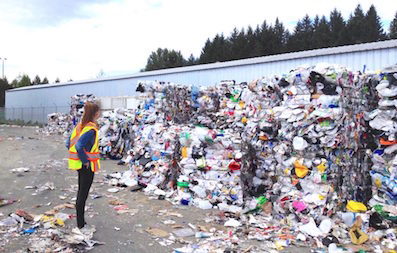 Cleanzine: your weekly cleaning and hygiene industry newsletter 10th July 2025 Issue no. 1170
Cleanzine: your weekly cleaning and hygiene industry newsletter 10th July 2025 Issue no. 1170
Your industry news - first
The original and best - for over 20 years!
We strongly recommend viewing Cleanzine full size in your web browser. Click our masthead above to visit our website version.
Winning ways to reach zero waste
 Every smart company is interested in reducing its footprint on the earth by developing ways to reduce waste and preserve resources for future generations.
Every smart company is interested in reducing its footprint on the earth by developing ways to reduce waste and preserve resources for future generations.
It's the right thing to do-and it is good business: research proves today's purchasers want to buy from companies that practice sustainable processes in their day-to-day business.
This drive to be more environmentally conscientious has led to the concept of 'zero waste'. But what exactly does zero waste mean and is it achievable or is it just another buzz phrase that will fade away as so many trendy but unsustainable business mantras before it?
Zero facts:
Since zero waste can have multiple interpretations, to reduce confusion, the Zero Waste Alliance issued this global definition in December 2018: Zero waste is the "responsible production, consumption, reuse and recovery of products, packaging and materials without burning and with no discharges to land, water or air that threaten the environment or human health".
In short, zero waste involves products made from materials that are sustainable and are 100% composted or recycled. Here it is important to note the words "are recycled" since, for example, despite its ability to be recycled, according to National Geographic, only an estimated lowly 9% of plastic actually is recycled.
Zero waste experience:
MCL Sustainable Solutions knows a lot about helping companies achieve zero waste. In fact, last July, MCL outfitted the 700,000sq.ft Metro Toronto Convention Centre, Canada's leading event facility, with several zero waste solutions that have helped make the centre one of the greenest in the world.
"I think our company name provides insight into how seriously we take sustainability," says MCL Sustainable Solutions operations director Jeremy Lethangue. "At MCL, we believe that to leave future generations a planet worth inheriting. We have a responsibility to reduce our use of non-sustainable resources and weave sustainable products and processes into our daily business and personal lives. We have to strive for zero waste."
Heading toward zero:
While appealing, the idea of initiating and maintaining a zero waste program can seem overwhelming at first. However, like most challenges in life, breaking the process down into steps can make the task easier-and achievable. With this in mind, MCL Sustainable Solutions offers these tips to help you start a zero waste program in your company.
* Create a team. Heading toward zero waste must be a group effort, so start off right by developing a team that fully understands and buys into the idea. You will be surprised to find that many workers will eagerly participate in a program that gives them a role in preserving the planet and human health. In fact, don't be surprised if you hear them bragging about it outside the workplace, which reflects well on you, the employer.
* Identify the sources. Investigate and record where your company's waste is generated-warehouse, cafeteria, office printers, desks, washrooms, etc. Be thorough and specific.
* Conduct a waste audit. Identify all the streams where the current waste is headed: recycling, landfill or compost.
* Set goals. Make your goals specific-and realistic. Include smaller steps so you and your staff can see progress along the way, such as all washroom and cafeteria towelling will be recycled within the first two months, for example.
* Meet your partners. Get to know your waste-diversion stakeholders, including haulers, recyclers and composters. Ask them to explain their specific roles and answer questions to help your team understand components vital to your program's success, such as local recycling laws, what plants accept what materials, etc.
* Reduce consumption. The less waste generated, the less there is to require disposal. Opt for reusable/durable products where possible; otherwise select compostable products.
* Select the best locations. Create sorting stations with options for composting, recycling and landfill and place them strategically where waste is generated. You will find most people-employees and visitors alike- will participate in the program willingly if you make it easy for them to do so.
* Be clear. Create effective, clear signage and place it above each waste-stream bin. Incorporate targeted graphics and colourful images to depict what types of waste belong where, especially in the beginning where there may be some confusion.
* Remain committed. We've all witnessed programs that start off with a bang only to fizzle due to management's lack of commitment. Prove that you are in it for the long haul. Make it part of new employee onboarding; conduct ongoing all-staff training. Post infographics depicting what 'big picture' waste-savings means to the planet.
* Personalise the fun. The best way to keep staff engaged in almost anything is to make it personal and as enjoyable as possible. Some examples: Hold contests to reward the department that recycles the most waste; give prizes for the best waste-reducing ideas; schedule monthly lunches to update staff on the program's progress.
* Practice sustainable patience. No company can reach zero waste overnight. Be flexible; re-evaluate parts of the program that aren't working; tweak those that are effective to further enhance results. Remember, when it comes to waste reduction, zero isn't the easiest number to reach, but you'll earn a lot of points from employees and customers alike for working toward it.
Image courtesy of Vivianne Lemay
12th September 2019







